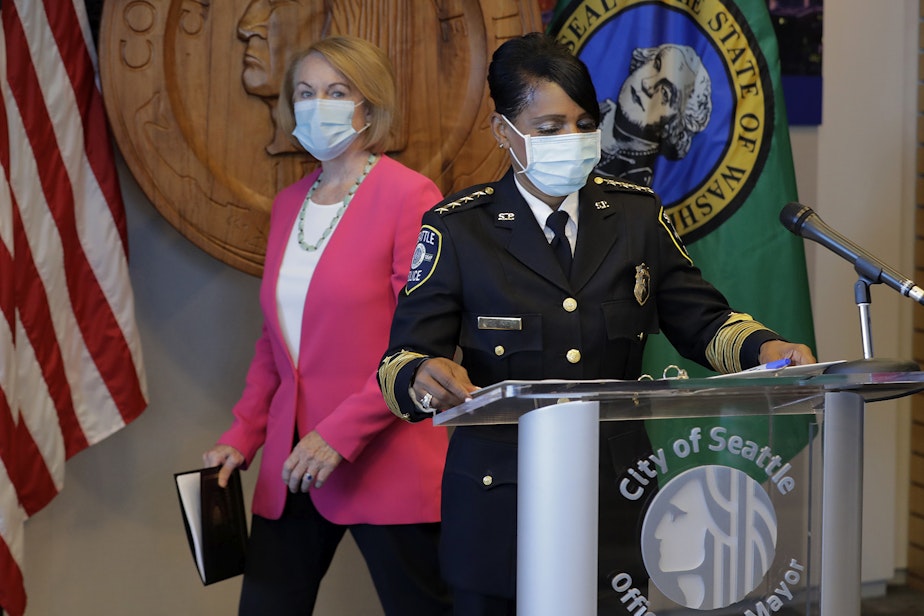Election recall fever hits Seattle politics

First, five Seattleites filed a petition to recall Mayor Jenny Durkan over her handling of police violence during this year’s protests.
Now, other elected officials in Seattle are targets.
Capitol Hill resident Grace Harvey, who is leading the Recall Durkan campaign effort, said the mayor is accused of letting Seattle Police use weapons like tear gas on protesters during a pandemic.
“Unrestricted use of chemical weapons by the SPD that endangers your respiratory system,” Harvey said.
King County Superior Court Judge Mary E. Roberts judge ruled in July that a recall can go forward on the basis of that charge.
Mayor Durkan has appealed that decision. Her legal defense is that Carmen Best made the call to use tear gas and that she had the authority to do so as police chief. Durkan also said Best’s decision was reasonable.
Durkan's challenge to the recall is now headed to the Washington State Supreme Court. If it’s allowed to go forward, Harvey said the campaign would still need around 50,000 signatures, which could prove difficult in an era of Covid-19 and social distancing.
Sponsored
But if they pull it off, a special election could occur, likely next year at the earliest. (An online petition to recall Mayor Durkan has gotten over 40,000 signatures, but it's not an official document).
Either way Durkan’s also for up re-election in 2021.
“Almost 60 percent of voters wanted me to be mayor. If at some point down the road the majority of voters don’t want me to be mayor, that’s democracy,” she told KUOW in July.
City Council member Kshama Sawant was the next official to land on the city recall list. She was re-elected last fall to represent Council District 3, which includes Capitol Hill, the Central Area, and Madison Park.
First, there was an online petition calling for Sawant to resign that got more than 5,000 signatures. But an online petition has no legal weight.
Sponsored
Then last week, Capitol Hill resident Ernie Lou filed a formal recall petition in King County Superior Court. Lou said the documents filed by the “Recall Durkan” campaign helped him figure out how to do it.
The charges include using her position to let hundreds of protesters inside city hall after hours during a pandemic.
“She is just a very a divisive figure. It’s almost like she’s the far left version of Trump,” Lou said.
Sawant could not be reached by KUOW for comment at the time this story was published.
For now, the recall Sawant drive appears to be moving forward. But like Durkan, Sawant is still a long way from actually being removed from office. Lou, however, says he lost a job over his campaign to oust Sawant.
Sponsored
City Council member Lisa Herbold has also landed on the possible recall list. West Seattle resident Tim McConnell created an unofficial online petition to recall her over a vote to eliminate police jobs.
It’s gotten thousands of signatures, but no formal petition has been filed, and McConnell has said he has no plans to do it. Herbold could not be reached for comment.
So that still leaves eight Seattle city council members who aren’t formal recall targets — yet.
Hugh Spitzer, a law professor at the University of Washington, said a recall isn’t easy to pull off in Washington by design. There needs to be "an allegation backed by facts that the elected official’s broken the law," Spitzer said.
He cited the case of the former Mayor Jim West of Spokane, for example, who was recalled after he allegedly offered a job to someone in exchange for sex.
Sponsored
In Washington, a recall can’t just be a political disagreement.
“This is different from a system in a number of other states where if the voters don’t like what someone they’ve elected is doing and demand a second election one or two years into somebody’s term,” he said.
As a result, Spitzer said, most cases get thrown out by the courts before they reach the signature phase.
But if Seattle’s mayor is recalled, she won’t be the first. That was Mayor Hiram C. Gill, who in 1911 was recalled due to a corruption scandal. Among other issues, his chief of police was getting paid $10 per month for every "prostitute" who worked in the city, according to a contemporary account that appeared in McClure's magazine.




